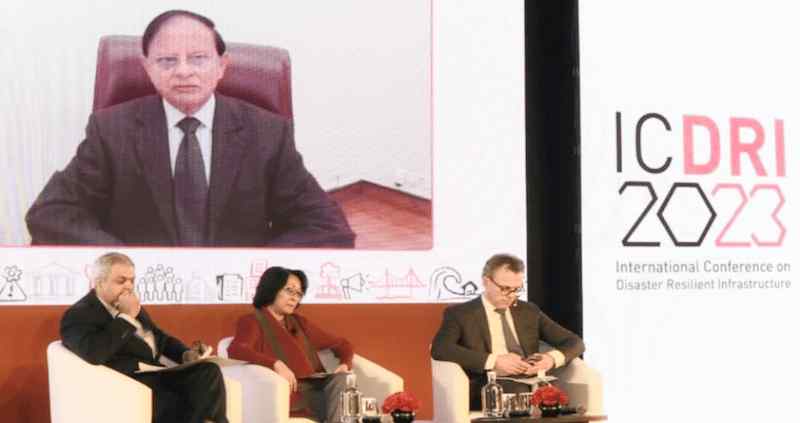- +91-11-4044-5999
- info@cdri.world
-
Copernicus Marg, New Delhi, INDIA

6 April, New Delhi: The 5th edition of the Coalition for Disaster Resilient Infrastructure (CDRI) flagship conference concluded today, which garnered the participation of more than 2,000 delegates from 158 countries, including the Small Island Developing States (SIDS) of Samoa, Haiti, Fiji, and the Dominican Republic, amongst others. ICDRI 2023 also secured participation from 140 global experts from more than 120 countries, representing 600 global organizations, the private sector, and academia, coming together to discuss and advance concrete solutions to deliver resilient and inclusive infrastructure.
Key highlights of the event included the launch of several new initiatives, including a Global Study on Disaster Resilience of Airports; the Lexicon on Disaster Resilient Infrastructure; an Academic Network for training next generation of infrastructure professionals (IRAX); and CDRI’s third Fellowship Cohort.
Speaking about ICDRI, PK Mishra, Principal Secretary to the Prime Minister, Government of India remarked, “Disaster resilience is no longer a niche subject. It has come to the centre stage of the global and national development discourse. While we want to facilitate north-south, south-south, north-north exchange, a large part of the infrastructure services will have to be delivered in the south. Therefore, in our search for solutions, we must focus on affordability, scalability and sustainability for emerging economies.”
Announcing the U.S. Government's new commitment at the CDRI General Council Meeting on April 3, Samantha Power, Administrator of the United States Agency for International Development (USAID) said, "If we are to help every community withstand disaster, it’s on all of us to identify new and existing partnerships that can help us strengthen community resilience – and to build a movement driven not just by governments, but by all."
Bhupender Yadav, Honourable Minister for Environment, Forest and Climate Change, Government of India shared “India has been working on strengthening end-to-end early warning systems for all hydro-meteorological hazards. Deaths due to cyclones in the country have reduced by 90% in the last 15 years. Early warning system for cyclones now covers almost the entire East and West Coast. India would now like to maximise the full protection of early warning systems for not just reducing the loss of lives but also livelihoods and national development themes.”
The 1st Phase of the Global Study on Disaster Resilience of Airports sheds light on the current state of practice of disaster risk management and resilience covering 111 airports across 54 countries. The perception study highlighted the increasing frequency and intensity of extreme weather events leading to third-party systems failures and financial losses due to partial infrastructure restrictions, flight delays, and indirect economic loss to airports.
The Lexicon on Disaster Resilient Infrastructure (DRI) aims to foster a shared conceptual understanding of infrastructure-related terms and phrases, providing a set of globally applicable references to concepts and phrases facilitating acting as a guide to research and understanding, and aid in infrastructure-related decision making of governments, academia and financial institutions, among others.
ICDRI 2023 also witnessed the launch of the Infrastructure Resilience Academic eXchange (IRAX), with the objective of developing enhanced opportunities for higher education and research in disaster resilient infrastructure. It will facilitate the creation of a cadre of industry-ready professionals on DRI, who can be deployed within countries and regions. In support of IRAX, USAID will provide up to $5 million to support a partnership between U.S. universities and Indian higher education institutions to offer education, research, training, and professional development opportunities on disaster resilient infrastructure.
CDRI’s Fellowship Cohort includes climate-risk profiles of Indian ports and identification of the mechanism utilising Mahatma Gandhi National Rural Employment Guarantee Act’s social audit structure to measure resilience of drought-proof infrastructure.
The conference concluded with CDRI and Member countries sharing a collection of evidence-based case studies highlighting a futuristic, adaptive and solution driven inclusive development pathways towards DRI globally. Representatives from countries including US, Italy, Mongolia, Fiji, Ghana, UK, EU, Dominican Republic, Canada, Sri Lanka, Germany, Netherlands, Japan, Samoa, Bhutan, Mauritius, France, Nepal attended the event.
About CDRI:
Launched by Hon. Prime Minister of India, Shri. Narendra Modi at the UN Climate Action Summit at New York on 23 September 2019, the Coalition for Disaster Resilient Infrastructure (CDRI) is a partnership of national governments, UN agencies and programmes, multilateral development banks and financing mechanisms, the private sector, and knowledge institutions that aims to promote the resilience of new and existing infrastructure systems to climate and disaster risks in support of sustainable development.
CDRI promotes rapid development of resilient infrastructure to respond to the Sustainable Development Goals’ imperatives of expanding universal access to basic services, enabling prosperity and decent work.
For further queries, please contact:
Mallika Srinivasan | (M): +91 9818094372 | mallika.srinivasan@cdri.world
Preeti Sehrawat | (M): +91 9711170599 | preeti@avianwe.com
Follow CDRI:
Website: cdri.world - Twitter: @cdri_world - LinkedIn: /company/coalition-for-disaster-resilient-infrastructure/